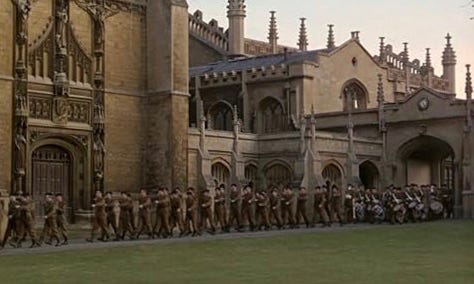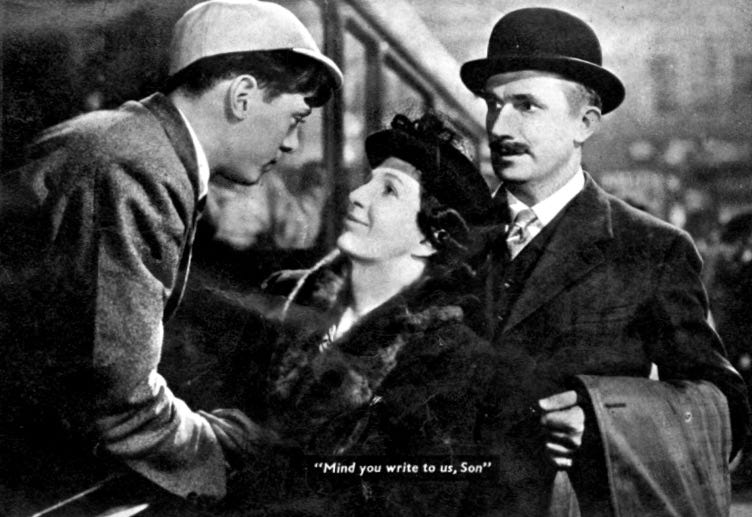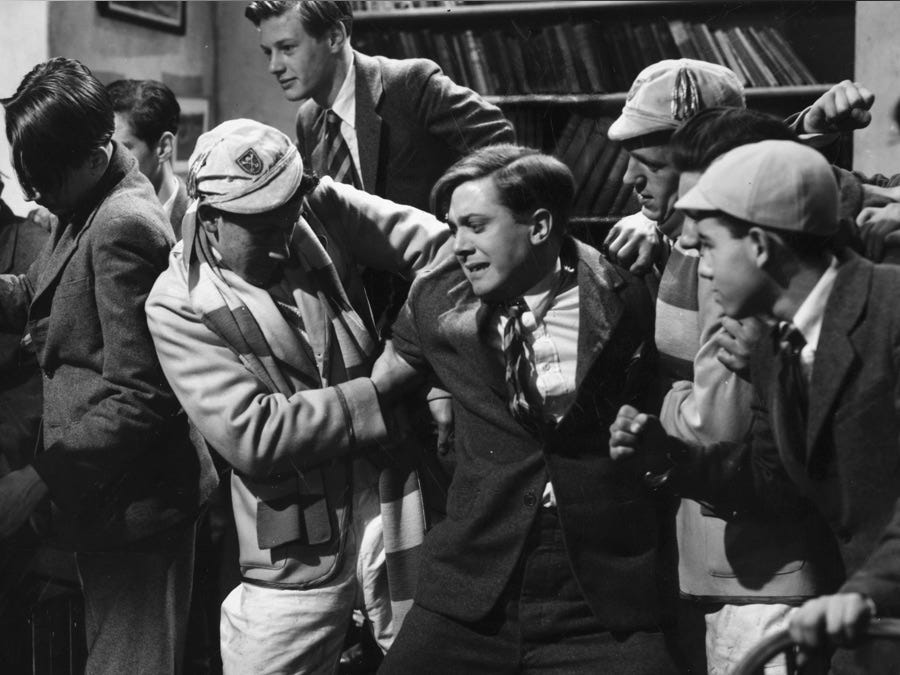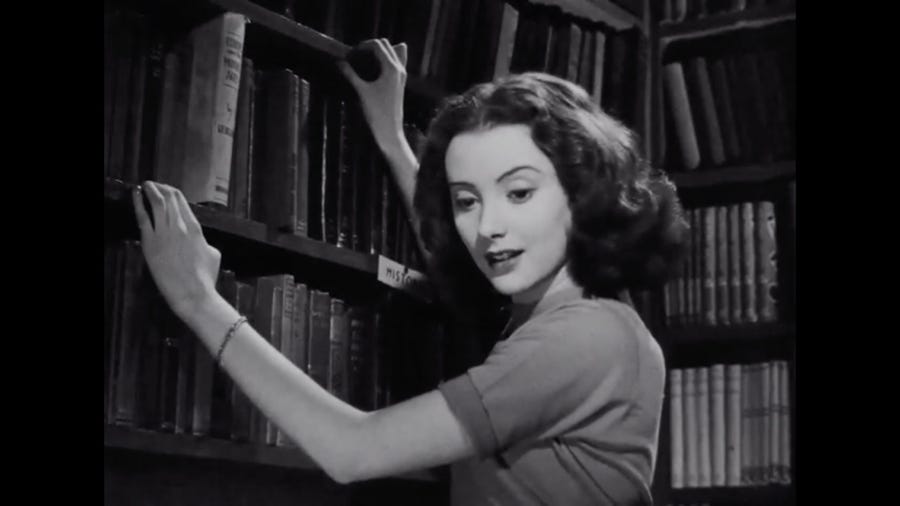The Guinea Pig (1948) joins a list of books and films in the literary and cinematic English public school tradition. A closed society. Where the older boys wielded considerable power over the thirteen and fourteen-year-old ‘fags’— in effect, their elders’ personal servants. Alec Waugh’s sensational novel, The Loom of Youth (1917), based on his personal experiences at Sherborne, with its hint of the Fives Court and illicit liaisons, scandalised British society. In contrast, the touching sob-fest, Goodbye Mr Chips (1939), filmed at Repton, did exactly the opposite. This was followed by Tom Brown’s Schooldays (1940 and 1951), filmed at Rugby; A Yank at Eton (1942), filmed in California and Connecticut; and Lindsay Anderson’s brilliant and misunderstood surrealist satire, If…. (1968), released at the time of the Paris revolt, in which wing-collared revolutionaries gun down the establishment in the neo-Gothic environs of Cheltenham’s quad; all this topped by the cricket jerseys and eye-liner of Another Country (1984), loosely based on Julian Mitchell’s imagined Winchester/Eton combo. In contrast, Jack Read, the hero of The Guinea Pig (1948), filmed again at Sherborne, is a working-class scholarship boy who survives snobbery and physical hardship and, just like Tom Brown, embraces the public school system to ultimately triumph.
The thing to understand about English public schools is that, historically, at least, they’re a relatively recent development— in the sense of how we understand them today. For ‘the public school ethos’ is essentially a Victorian creation. And a progressive creation at that. It’s a slightly complicated story. By the early 19th century, the famous, ancient ‘public’ institutions ( i.e. schools that admitted anybody and everybody, regardless of profession, location or creed— as long as you could cough up the fees) had fallen into decline, both in discipline and numbers. We’re talking Winchester (1382), Eton (1440), Westminster (refounded 1560), Rugby (1567), Harrow (1572) and Charterhouse (1611). In 1710, the Winchester boys rebelled against the beer ration, and in the Rugby rebellion of 1797, the army (a local recruitment detachment) had to be called out to put it down. Between 1797 and 1832, there were ten further rebellions in public schools, four at Eton, three at Winchester and one each at Charterhouse, Harrow and Shrewsbury.
So, by the 1840s, the time had come for a new type of school. A school more in tune with progressive Victorian values. In contrast to the older schools, with their motley confetti of aristos, landed gentry, louche grandees, the sons of merchants and local tradesmen (Etonians Beau Brummell and Thomas Arne, the sons of a confectioner and a bankrupt upholsterer, both) the new Victorian schools— Cheltenham (1841), Marlborough (1843), Wellington (1859) and Haileybury (1862)— catered for the sons of a rising breed: the pushy, Empire-building, aspirational upper-middle class. And with the new schools came snobbery and prim, fashionable Protestant evangelism. Cheltenham College, which had army connexions (especially Anglo-Indian) from the very beginning, was founded by two army officers for ‘the sons of ‘those moving in the circle of gentlemen, no retail trader being under any circumstances to be considered.’ If Papa didn’t cut the mustard, tough titty.
And alongside the new schools came the zeal of the great reforming headmasters, the influence of Rugby’s Dr. Arnold (Tom Brown’s headmaster)— and his subsequent followers, with their ‘Muscular Christianity’: compulsory, organised games (a handy alternative to disorganised wanking); routine chapel, cold showers and runs, discipline and athleticism, the esprit de corps of the house system, and the school Rifle Corps (then sort of nationalised, and given official government recognition to become The Officer Training Corps in the Haldane reforms of 1908): gentlemen factories producing team-players, for the army, politics and the colonial civil service— and latterly, in our own century, the slick, corporate life of big business: even if the antiquity, traditions and slang of the new Victorian schools were essentially fake, with their spanking new Gothic settings, ‘monastic’ stained glass and ‘medieval’ cloisters and quads, which in the late 19th century, would have been only thirty or forty years old, the same distance today, say as the 1980s.
By 1944, the Fleming Report, ‘as part of the post Second World War desire for social reform’, recommended that 25% of public school pupils should be state-supported under a national bursary scheme for ‘children who might benefit from boarding’. Which brings us neatly to The Guinea Pig (1948), produced and directed by the Boulting Brothers, John and Roy, and based on Warren Cheetham-Stroud’s play (cracking name, that) of 1946— a West End hit. I’ve seen this film twice now, one of the lesser-known public-school sagas set during the Second World War, and I rate it highly. It’s a stiff-upper-lip tear-jerker— of course it is; it’s a product of its time, and no shame in that (I’m a huge fan of Terence Rattigan), but it’s beautifully acted and written with genuinely touching performances, especially from Richard Attenborough. Dickie stars as Jack Read, a working-class (or perhaps, lower middle-class) boy, the son of a former Sergeant Major and tobacconist, who’s sent by the state as an experiment— a guinea pig— to Saintbury, a famous public school, found supposedly in Hampshire but actually filmed at Sherborne School in Dorset. Attenborough was twenty-four at the time and probably too old to play a thirteen to eighteen-year-old— but I’m not too fussed. His performance is touchingly vulnerable, with all the naivety, innocence, expectation— and hope of a ‘new boy’ at boarding school. There’s a moving, steamy farewell from his proud parents (Joan Hickson and Bernard Miles) at Waterloo.
Robert Flemyng also stars as the kind, wise and worldly House Tutor, Nigel Lorraine, an immensely sympathetic ex-army officer who’s lost a leg at El-Alamein— who takes Jack under his wing in defence of the dismal Mr. Hartley (Cecil Trouncer), Jack’s housemaster— a pedantic martinet with all the snobbery of a stuffed shirt who, predictably, finds the government scheme absurd. In his other life, Robert Flemyng had a distinguished and brave wartime career in the Royal Army Medical Corps, rising to the rank of Colonel at the tender age of thirty-three, winning an MC and mentioned in despatches. It’s also worth pointing out that many of the actors we see in the war films of this period— Lt-Colonel David Niven, The Rifle Brigade; Captain Richard Todd, 7th (Light Infantry) Parachute Batallion, and Captain Basil Rathbone MC, King’s Liverpool Regiment (Liverpool Scottish)— are in effect, playing themselves, if a few years down the line.
Inevitably, poor Jack has to defend himself against the inevitable snobbery: his cockney accent, his parent’s humble status, his gauche manner (pens lined up in his top pocket), but then, the public school of the 1940s was a bit like the army, wasn’t it? Character building and all that comes with it. They break you down to build you up. And that public school thing where the older boys are more terrifying than the masters. But without giving too much away, The Guinea Pig ends on a happier note (depending on your point of view), with Jack embracing the system— losing his accent along the way— and winning a place at Cambridge, even if his mother (Joan Hickson) has to go back to work to pay for it.
The quality of British acting in this period is top notch. Sheila Sim makes a cracking Wren (fetching uniform) and housemaster’s daughter (twinset and pearls), and Brenda Hogan’s terrific as the local vamp, the ‘plum tart’ who works in a bookshop, although someone please explain to me why she gets the hots for a gauche, podgy schoolboy in a cap? When Jack looks as if he might be more interested in a ginger beer and his butterfly collection? As opposed to a roll in the stacks? And the splendid Anthony Nicholls appears as the sympathetic headmaster. Eagle-eyed readers might remember him as General Denton in If…. (1968). And there’s this little moralising speech at the end from Bernard Miles as the ex-NCO, tobacconist father:
You see Mr. Hartley, Sir, your school doesn’t only go in for book learning, you teach things which they don’t teach in other places… team spirit, self-confidence… how to get on with the other fella’… being under a man like you, Mr. Hartley, has given our Jack the finest start he could ever have. I only wish I could have had an opportunity like it when I was his age…
So there you go. The Guinea Pig (1948). A stiff-upper-lip period piece, if ever there was. A very different Britain. A different time and a different place. But it’s a terrific film in my opinion: subtle, touching and beautifully acted— reducing me to Man Tears at the end, big softie that I am. They don’t make ‘em like that anymore.
I watched The Guinea Pig (1948) on Amazon Prime Video digital download and I’m delighted to report that the BFI have released the film in a dual format edition, which means DVD and Blu-ray.
You’ve just been reading a newsletter for both free and 'paid-for' subscribers. I hope you enjoyed it. Thank you to all those of you who have signed up so far.
There are two options on Luke Honey’s WEEKEND FLICKS. Cinema for Grown Ups: ‘Paid-for’ subscribers get an extra exclusive film recommendation every Friday morning, plus full access to the complete archive— which is currently at film no. 90, and should list over a hundred films by the end of the year. It costs £5 a month (or £50 a year)— a bargain, frankly, when you compare it to a few cups of coffee, a packet of semi-legal gaspers, or a pint of beer in the pub. ‘Free’ subscribers get access to the Sunday newsletter, plus the ‘free subscriber’ films in the archive. Either option is a good bet. And when I get my act together, I’m planning to add a spoken voiceover (mine!) for paid subscribers.
I will be back next Friday. In the meantime, I hope you have a relaxing and cinematic Sunday.














As a fourth (and I'm happy to say last) generation public school boy this story is familiar territory, although by the time I attended 'fagging' and beating at least were things of the past. No doubt my contempt for the whole system explains why 'If' is one of my favourites movies!
Added a couple to my watchlist (I've seen most of the films discussed - and lately I've been distracted with a personal Glynis Johns festival)